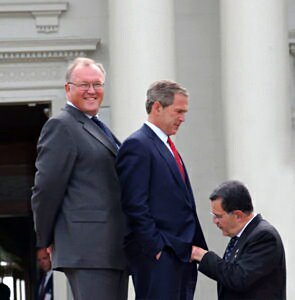“When government becomes more fearful of its citizens and their rights than protective of them, the future holds only despotism and extinction.”

'In crowd’ may be a detriment to U.S.
by Col. Daniel M. Smith (Ret.)
Link Here
It’s hard to discuss the unknown, especially when, to paraphrase Defense Secretary Donald Rumsfeld, you don’t know that you don’t know.
Almost as hard is discussing the unknown when you know you don’t know – e.g., what the future holds.
Then there are the artificial unknowns that arise not from biological limitations or inadequate technology but from one individual, group, or institution with “information” refusing to share it.
This sets in motion a spiraling descent into paranoia as those “in the know” come to believe the “others” will stop at nothing to discover the “secret.” Thus reasoned, the “ins” interpret the actions of the “outs” as a potential internal threat (fifth column) that must be carefully monitored.
Of course, having started down this road, the “ins” soon subdivide into “inner-ins” and “outer-ins,” with the former suspicious of and watching the latter.
Eventually, a small, powerful group emerges – the “innermost-ins.” Only they know the highest secrets – including the ones that are so secret that they cannot be discussed with anyone else.
Although not one of the “ins,” I too have a secret. You may already know it; if not, I’ll tell you. (We could then be our own “in-crowd.”)
I learned it from that universal sage, Unknown: “When government becomes more fearful of its citizens and their rights than protective of them, the future holds only despotism and extinction.”
We saw the slide in this direction during the 1960s and 1970s. Successive U.S. administrations exhibited profound distrust, even disdain, for those who challenged government by exercising the civil and political rights provided in the Constitution.
Impassioned Vietnam War protesters and civil rights advocates believed they could force changes in government policy and practice if they but persisted.
Fearing the same outcomes, officials secretly tasked intelligence agencies normally focused on external enemies – the Pentagon and CIA – to gather, record, and exchange information with internal U.S. law enforcement agencies about “U.S. persons” (citizens and legal residents) participating in anti-Washington events anywhere in the country.
When the Army snooping ended in 1971, it had records on more than 100,000 civilians. Clearly, government feared the citizenry and the power of its protests to attract increasing numbers of believers.
Continues...




0 Comments:
Post a Comment
<< Home